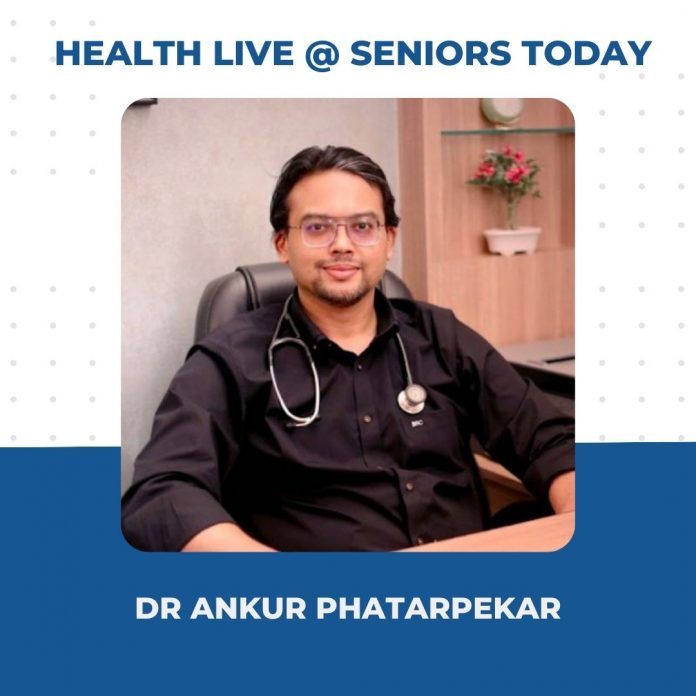On 12 Feb, 2022 Seniors Today hosted another one of its weekly Health Live Webinars. This week we had with us a leading cardiologist, Dr Ankur Phatarpekar who spoke on Heart Valve and Special Cardiac Concerns for Seniors.
About Dr Ankur Phatarpekar:
He is an alumnus of the Seth GS Medical College. He has performed more than 300 PCI procedures as primary operator including 50 primary angioplasties in myocardial infarction (PAMI). Considerable experience in managing chronic total occlusions and use of intravascular ultrasonograpghy (IVUS). Attended workshops on OCT in coronary arteries under Dr Guglielmo. He has before more than 100 balloon mitral and has performed device closures of ASD, PDA and VSD, balloon procedures of aortic and pulmonary valve, coarctoplasty.
He has a special interest in structural Performed and assisted in complex structural heart disease procedures like device closure of ruptured sinus of Valsalva. alcohol septa) ablation in HOCM, vertical vein closure, Post Ml VSR device closures. He is also active in the upcoming field of Oncocardiology , having experience of treating a special subset of oncology patients with long-term cardiac issues due to chemotherapy.
Heart is basically a pump that pumps the blood that comes from the lung to the other parts of the body and provides them with oxygenated blood.
There are 4 valves and chambers. The right chamber has 2 chambers and every chamber has a valve beneath; and every valve opens in one direction.
The bad blood or the deoxygenated blood goes from one chamber to the other chamber, in the right side goes through the valve and goes to the lungs to get oxygenated. And then comes back to the left side after getting oxygenated and enters the third and the fourth chamber on the left side.
As you age, the valves also undergo ageing and degenerative changes like the rest of your organs. They become thickened and calcified.
And so most of the aged people come either with valve thickening or valve stenosis; which means that there is obstruction to the flow and the outflow to the heart.
Unfortunately, at this point of time we do not have a great set of medications to arrest this process.
Though there are medications that can help in decreasing the blockages from the heart. But there are still no good medications for reversing these degenerative changes that have set in the body.
Dr Ankur suggests that you have a regular follow up with your cardiologist. Respect and take note of symptoms like
- Breathlessness
- Chest pain
- Restlessness
- Syncope
- Blackening in front of your eyes.
These are symptoms of changes in the valves and these symptoms are very similar to obstruction in vessels. And this is exactly why it is important to follow up with your cardiologist and get an ECG and 2D Echocardiogram regularly.
Post angioplasty these are the things that you can do/ your treating cardiologist will do to know that you’re in good shape
- An ECG and 2D ECHO.
- Sometimes a stress test is also advised.
Here are a few things that you should do to keep the disease from advancing (post angiography)
- You need to get your heart rate under control (60-80 bpm)
- Keep your blood pressure under 130/80 mm of Hg unless you’re over 80 years of age
- The LDL cholesterol should be kept below 50 mg/dL
- If you’re a diabetic keep your HbA1c at 7 or below
If you take care of these 4 things. You’ll keep the disease from progressing.
When you are on blood thinners, make sure that you don’t fall or have any trauma because that means that you will bleed more.
If you are on cholesterol lowering medicines, which are statins, though these are very good for the heart, they might cause muscle aches and pains as a side effect.
There are studies that suggest that when you put individuals on statins the calcification changes can be arrested but reversing of the disease is still a question that is unanswered.
Cardiomegaly can be due to a number of reasons
- Hypertension
- Valvular issues
- Poorly controlled blood pressure is the most common cause for it
You can contact Dr Ankur on – Mob: 9820384743
Email ID: doctorankurmd@gmail.com








